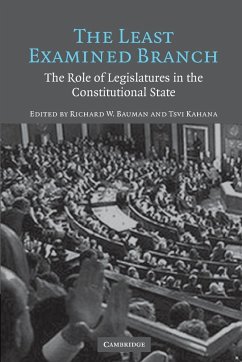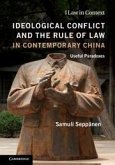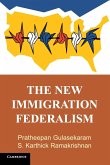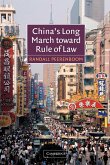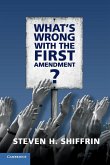Richard W. Bauman / Tsvi Kahana (eds.)The Role of Legislatures in the Constitutional State
The Least Examined Branch
The Role of Legislatures in the Constitutional State
Herausgeber: Bauman, Richard W.; Kahana, Tsvi
Richard W. Bauman / Tsvi Kahana (eds.)The Role of Legislatures in the Constitutional State
The Least Examined Branch
The Role of Legislatures in the Constitutional State
Herausgeber: Bauman, Richard W.; Kahana, Tsvi
- Broschiertes Buch
- Merkliste
- Auf die Merkliste
- Bewerten Bewerten
- Teilen
- Produkt teilen
- Produkterinnerung
- Produkterinnerung
This book addresses the role of legislatures in constitutional democracies.
Andere Kunden interessierten sich auch für
![Ideological Conflict and the Rule of Law in Contemporary China Ideological Conflict and the Rule of Law in Contemporary China]() Samuli SeppänenIdeological Conflict and the Rule of Law in Contemporary China47,99 €
Samuli SeppänenIdeological Conflict and the Rule of Law in Contemporary China47,99 €![The Path of the Law and Its Influence The Path of the Law and Its Influence]() Steven J. Burton (ed.)The Path of the Law and Its Influence52,99 €
Steven J. Burton (ed.)The Path of the Law and Its Influence52,99 €![Islamic Jurisprudence in the Classical Era Islamic Jurisprudence in the Classical Era]() Norman CalderIslamic Jurisprudence in the Classical Era37,99 €
Norman CalderIslamic Jurisprudence in the Classical Era37,99 €![Year Books of the Reign of King Edward the First Year Books of the Reign of King Edward the First]() Year Books of the Reign of King Edward the First57,99 €
Year Books of the Reign of King Edward the First57,99 €![The New Immigration Federalism The New Immigration Federalism]() Pratheepan GulasekaramThe New Immigration Federalism39,99 €
Pratheepan GulasekaramThe New Immigration Federalism39,99 €![China's Long March Toward Rule of Law China's Long March Toward Rule of Law]() Randall P. PeerenboomChina's Long March Toward Rule of Law71,99 €
Randall P. PeerenboomChina's Long March Toward Rule of Law71,99 €![What's Wrong with the First Amendment What's Wrong with the First Amendment]() Steven H. ShiffrinWhat's Wrong with the First Amendment33,99 €
Steven H. ShiffrinWhat's Wrong with the First Amendment33,99 €-
-
-
This book addresses the role of legislatures in constitutional democracies.
Hinweis: Dieser Artikel kann nur an eine deutsche Lieferadresse ausgeliefert werden.
Hinweis: Dieser Artikel kann nur an eine deutsche Lieferadresse ausgeliefert werden.
Produktdetails
- Produktdetails
- Verlag: Cambridge University Press
- Seitenzahl: 616
- Erscheinungstermin: 6. November 2013
- Englisch
- Abmessung: 234mm x 156mm x 36mm
- Gewicht: 1034g
- ISBN-13: 9780521676823
- ISBN-10: 0521676827
- Artikelnr.: 22714555
- Herstellerkennzeichnung
- Libri GmbH
- Europaallee 1
- 36244 Bad Hersfeld
- gpsr@libri.de
- Verlag: Cambridge University Press
- Seitenzahl: 616
- Erscheinungstermin: 6. November 2013
- Englisch
- Abmessung: 234mm x 156mm x 36mm
- Gewicht: 1034g
- ISBN-13: 9780521676823
- ISBN-10: 0521676827
- Artikelnr.: 22714555
- Herstellerkennzeichnung
- Libri GmbH
- Europaallee 1
- 36244 Bad Hersfeld
- gpsr@libri.de
Richard W. Bauman is Professor of Law at the University of Alberta where he is also Chair of the Management Board of the Centre for Constitutional Studies. He was educated at the University of Alberta, Dalhousie University, and Oxford University. His most recent book is Ideology and Community in the First Wave of Critical Legal Studies. He has published in law journals in Canada, the U.S., and South Africa.
Tsvi Kahana is an assistant Professor of Law at Queen's University, Ontario, Canada. He has taught courses at the University of Alberta, the University of Toronto, and Tel-Aviv University. His work has been published at The University of Toronto Law Journal, The Journal of Canadian Public Administration, Queen's Law Journal, and The Supreme Court Law Review.
Tsvi Kahana is an assistant Professor of Law at Queen's University, Ontario, Canada. He has taught courses at the University of Alberta, the University of Toronto, and Tel-Aviv University. His work has been published at The University of Toronto Law Journal, The Journal of Canadian Public Administration, Queen's Law Journal, and The Supreme Court Law Review.
Foreword Amy Guttman; Introduction Richard W. Bauman and Tsvi Kahana; Part
I. Legislatures and Democratic Theory: 1. Principles of legislation Jeremy
Waldron; 2. An exact epitome of the people Russell Hardin; 3. Political
accountability, proxy accountability, and the democratic legitamacy of
legislatures Jane S. Schacter; 4. Constitutionalism, trade legislation, and
'democracy' Chantal Thomas; Part II. Legislating and Deliberating in the
Democratic Legislature: 5. Legislative judgment and the enlarged mentality:
taking religious perspectives Jennifer Nedelsky; 6. Should we value
legislative integrity? Andrei Marmor; 7. Nondelegation principles Cass
Sunstein; 8. Populism, the legislative process and the Canadian
constitution; Part III. Constitution-making by Legislatures: The Explicit
Version: 9. Legislatures as constitutent assemblies Jon Elster; 10.
Legislatures and the phases and components of constitutionalism Ruth
Gavison; 11. Legislatures and constitutional agnosticism Patricia Hughes;
12. Constitutional amendments and the constitutional common law Adrian
Vermeule; Part IV. Constitution-Making by Legislatures: The Implicit
Version: 13. What do constitutions do that statutes don't (legally
speaking)? Frank I. Michelman; 14. Conditions for framework legislation
Elizabeth Garrett; 15. Super-statutes: the new American constitutionalism
William N. Eskridge, Jr. and John Ferejohn; Part V. Constitutional
Interpretation and Application by the Legislature: 16. Interpretation in
legislatures and courts: incentives and institutional design Mark Tushnet;
17. Constitutional engagement 'outside the courts' (and 'inside the
legislature'): reflections on professional expertise and the ability to
engage in constitutional interpretation Sanford Levinson; 18. Legislation
as constitutional interpretation: another dialogue Andrée Lajoie with
Cécile Bergada and Éric Gélineau; 19. The constitution and congressional
committees: 1971-2000 Keith E. Whittington, Neal Devins and Hutch Hicken;
Part VI. Is Legislative Constitutionalism Possible?: 20. Democratic
decision-making as the first principle of contemporary constitutionalism
Jeremy Webber; 21. Legislative constitutionalism in a system of judicial
supremacy Daniel A. Farber; 22. Between supremacy and exclusivity Owen
Fiss; 23. Legislatures as rule-followers Frederick Schauer; 24. Popular
revolution or popular constitutionalism? Reflections on the constitutional
politics of Quebec Secession Sujit Choudhry; Part VII. The Legislatures in
Dialogue: Domestic and International Contexts: 25. Disobeying parliament?
Privative clauses and the rule of law David Dyzenhaus; 26. Look who's
talking now: dialogue theory and the return to democracy Andrew Petter; 27.
An international community of legislatures? Daphne Barak-Erez; 28.
Legislatures in dialogue with one another: dissent, decisions, and the
global polity Heather K. Gerken.
I. Legislatures and Democratic Theory: 1. Principles of legislation Jeremy
Waldron; 2. An exact epitome of the people Russell Hardin; 3. Political
accountability, proxy accountability, and the democratic legitamacy of
legislatures Jane S. Schacter; 4. Constitutionalism, trade legislation, and
'democracy' Chantal Thomas; Part II. Legislating and Deliberating in the
Democratic Legislature: 5. Legislative judgment and the enlarged mentality:
taking religious perspectives Jennifer Nedelsky; 6. Should we value
legislative integrity? Andrei Marmor; 7. Nondelegation principles Cass
Sunstein; 8. Populism, the legislative process and the Canadian
constitution; Part III. Constitution-making by Legislatures: The Explicit
Version: 9. Legislatures as constitutent assemblies Jon Elster; 10.
Legislatures and the phases and components of constitutionalism Ruth
Gavison; 11. Legislatures and constitutional agnosticism Patricia Hughes;
12. Constitutional amendments and the constitutional common law Adrian
Vermeule; Part IV. Constitution-Making by Legislatures: The Implicit
Version: 13. What do constitutions do that statutes don't (legally
speaking)? Frank I. Michelman; 14. Conditions for framework legislation
Elizabeth Garrett; 15. Super-statutes: the new American constitutionalism
William N. Eskridge, Jr. and John Ferejohn; Part V. Constitutional
Interpretation and Application by the Legislature: 16. Interpretation in
legislatures and courts: incentives and institutional design Mark Tushnet;
17. Constitutional engagement 'outside the courts' (and 'inside the
legislature'): reflections on professional expertise and the ability to
engage in constitutional interpretation Sanford Levinson; 18. Legislation
as constitutional interpretation: another dialogue Andrée Lajoie with
Cécile Bergada and Éric Gélineau; 19. The constitution and congressional
committees: 1971-2000 Keith E. Whittington, Neal Devins and Hutch Hicken;
Part VI. Is Legislative Constitutionalism Possible?: 20. Democratic
decision-making as the first principle of contemporary constitutionalism
Jeremy Webber; 21. Legislative constitutionalism in a system of judicial
supremacy Daniel A. Farber; 22. Between supremacy and exclusivity Owen
Fiss; 23. Legislatures as rule-followers Frederick Schauer; 24. Popular
revolution or popular constitutionalism? Reflections on the constitutional
politics of Quebec Secession Sujit Choudhry; Part VII. The Legislatures in
Dialogue: Domestic and International Contexts: 25. Disobeying parliament?
Privative clauses and the rule of law David Dyzenhaus; 26. Look who's
talking now: dialogue theory and the return to democracy Andrew Petter; 27.
An international community of legislatures? Daphne Barak-Erez; 28.
Legislatures in dialogue with one another: dissent, decisions, and the
global polity Heather K. Gerken.
Foreword Amy Guttman; Introduction Richard W. Bauman and Tsvi Kahana; Part
I. Legislatures and Democratic Theory: 1. Principles of legislation Jeremy
Waldron; 2. An exact epitome of the people Russell Hardin; 3. Political
accountability, proxy accountability, and the democratic legitamacy of
legislatures Jane S. Schacter; 4. Constitutionalism, trade legislation, and
'democracy' Chantal Thomas; Part II. Legislating and Deliberating in the
Democratic Legislature: 5. Legislative judgment and the enlarged mentality:
taking religious perspectives Jennifer Nedelsky; 6. Should we value
legislative integrity? Andrei Marmor; 7. Nondelegation principles Cass
Sunstein; 8. Populism, the legislative process and the Canadian
constitution; Part III. Constitution-making by Legislatures: The Explicit
Version: 9. Legislatures as constitutent assemblies Jon Elster; 10.
Legislatures and the phases and components of constitutionalism Ruth
Gavison; 11. Legislatures and constitutional agnosticism Patricia Hughes;
12. Constitutional amendments and the constitutional common law Adrian
Vermeule; Part IV. Constitution-Making by Legislatures: The Implicit
Version: 13. What do constitutions do that statutes don't (legally
speaking)? Frank I. Michelman; 14. Conditions for framework legislation
Elizabeth Garrett; 15. Super-statutes: the new American constitutionalism
William N. Eskridge, Jr. and John Ferejohn; Part V. Constitutional
Interpretation and Application by the Legislature: 16. Interpretation in
legislatures and courts: incentives and institutional design Mark Tushnet;
17. Constitutional engagement 'outside the courts' (and 'inside the
legislature'): reflections on professional expertise and the ability to
engage in constitutional interpretation Sanford Levinson; 18. Legislation
as constitutional interpretation: another dialogue Andrée Lajoie with
Cécile Bergada and Éric Gélineau; 19. The constitution and congressional
committees: 1971-2000 Keith E. Whittington, Neal Devins and Hutch Hicken;
Part VI. Is Legislative Constitutionalism Possible?: 20. Democratic
decision-making as the first principle of contemporary constitutionalism
Jeremy Webber; 21. Legislative constitutionalism in a system of judicial
supremacy Daniel A. Farber; 22. Between supremacy and exclusivity Owen
Fiss; 23. Legislatures as rule-followers Frederick Schauer; 24. Popular
revolution or popular constitutionalism? Reflections on the constitutional
politics of Quebec Secession Sujit Choudhry; Part VII. The Legislatures in
Dialogue: Domestic and International Contexts: 25. Disobeying parliament?
Privative clauses and the rule of law David Dyzenhaus; 26. Look who's
talking now: dialogue theory and the return to democracy Andrew Petter; 27.
An international community of legislatures? Daphne Barak-Erez; 28.
Legislatures in dialogue with one another: dissent, decisions, and the
global polity Heather K. Gerken.
I. Legislatures and Democratic Theory: 1. Principles of legislation Jeremy
Waldron; 2. An exact epitome of the people Russell Hardin; 3. Political
accountability, proxy accountability, and the democratic legitamacy of
legislatures Jane S. Schacter; 4. Constitutionalism, trade legislation, and
'democracy' Chantal Thomas; Part II. Legislating and Deliberating in the
Democratic Legislature: 5. Legislative judgment and the enlarged mentality:
taking religious perspectives Jennifer Nedelsky; 6. Should we value
legislative integrity? Andrei Marmor; 7. Nondelegation principles Cass
Sunstein; 8. Populism, the legislative process and the Canadian
constitution; Part III. Constitution-making by Legislatures: The Explicit
Version: 9. Legislatures as constitutent assemblies Jon Elster; 10.
Legislatures and the phases and components of constitutionalism Ruth
Gavison; 11. Legislatures and constitutional agnosticism Patricia Hughes;
12. Constitutional amendments and the constitutional common law Adrian
Vermeule; Part IV. Constitution-Making by Legislatures: The Implicit
Version: 13. What do constitutions do that statutes don't (legally
speaking)? Frank I. Michelman; 14. Conditions for framework legislation
Elizabeth Garrett; 15. Super-statutes: the new American constitutionalism
William N. Eskridge, Jr. and John Ferejohn; Part V. Constitutional
Interpretation and Application by the Legislature: 16. Interpretation in
legislatures and courts: incentives and institutional design Mark Tushnet;
17. Constitutional engagement 'outside the courts' (and 'inside the
legislature'): reflections on professional expertise and the ability to
engage in constitutional interpretation Sanford Levinson; 18. Legislation
as constitutional interpretation: another dialogue Andrée Lajoie with
Cécile Bergada and Éric Gélineau; 19. The constitution and congressional
committees: 1971-2000 Keith E. Whittington, Neal Devins and Hutch Hicken;
Part VI. Is Legislative Constitutionalism Possible?: 20. Democratic
decision-making as the first principle of contemporary constitutionalism
Jeremy Webber; 21. Legislative constitutionalism in a system of judicial
supremacy Daniel A. Farber; 22. Between supremacy and exclusivity Owen
Fiss; 23. Legislatures as rule-followers Frederick Schauer; 24. Popular
revolution or popular constitutionalism? Reflections on the constitutional
politics of Quebec Secession Sujit Choudhry; Part VII. The Legislatures in
Dialogue: Domestic and International Contexts: 25. Disobeying parliament?
Privative clauses and the rule of law David Dyzenhaus; 26. Look who's
talking now: dialogue theory and the return to democracy Andrew Petter; 27.
An international community of legislatures? Daphne Barak-Erez; 28.
Legislatures in dialogue with one another: dissent, decisions, and the
global polity Heather K. Gerken.

